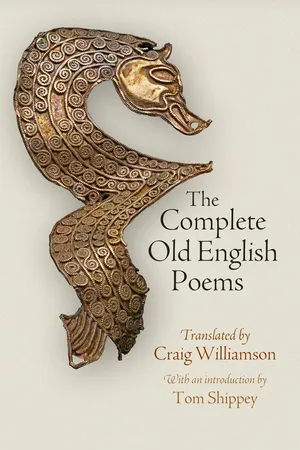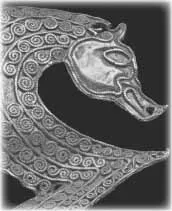
- 1,248 pages
- English
- ePUB (mobile friendly)
- Available on iOS & Android
The Complete Old English Poems
About this book
From the riddling song of a bawdy onion that moves between kitchen and bedroom to the thrilling account of Beowulf's battle with a treasure-hoarding dragon, from the heart-rending lament of a lone castaway to the embodied speech of the cross upon which Christ was crucified, from the anxiety of Eve, who carries "a sumptuous secret in her hands / And a tempting truth hidden in her heart, " to the trust of Noah who builds "a sea-floater, a wave-walking / Ocean-home with rooms for all creatures, " the world of the Anglo-Saxon poets is a place of harshness, beauty, and wonder.Now for the first time, the entire Old English poetic corpus—including poems and fragments discovered only within the past fifty years—is rendered into modern strong-stress, alliterative verse in a masterful translation by Craig Williamson.Accompanied by an introduction by noted medievalist Tom Shippey on the literary scope and vision of these timeless poems and Williamson's own introductions to the individual works and his essay on translating Old English poetry, the texts transport us back to the medieval scriptorium or ancient mead-hall, to share a herdsman's recounting of the story of the world's creation or a people's sorrow at the death of a beloved king, to be present at the clash of battle or to puzzle over the sacred and profane answers to riddles posed over a thousand years ago. This is poetry as stunning in its vitality as it is true to its sources. Were Williamson's idiom not so modern, we might think that the Anglo-Saxon poets had taken up the lyre again and begun to sing once more.
Tools to learn more effectively

Saving Books

Keyword Search

Annotating Text

Listen to it instead
Information

Table of contents
- Cover
- Title Page
- Copyright
- Dedication
- Contents
- Introduction
- Note on the Texts, Titles, and Organization of the Poems
- List of Abbreviations
- On Translating Old English Poetry
- The Junius Manuscript
- The Vercelli Book
- The Exeter Book
- Beowulf and Judith
- The Metrical Psalms of the Paris Psalter and the Meters of Boethius
- The Minor Poems
- Additional Poems
- Appendix of Possible Riddle Solutions
- Bibliography
- Index of Poem Titles
- Acknowledgments
Frequently asked questions
- Essential is ideal for learners and professionals who enjoy exploring a wide range of subjects. Access the Essential Library with 800,000+ trusted titles and best-sellers across business, personal growth, and the humanities. Includes unlimited reading time and Standard Read Aloud voice.
- Complete: Perfect for advanced learners and researchers needing full, unrestricted access. Unlock 1.4M+ books across hundreds of subjects, including academic and specialized titles. The Complete Plan also includes advanced features like Premium Read Aloud and Research Assistant.
Please note we cannot support devices running on iOS 13 and Android 7 or earlier. Learn more about using the app